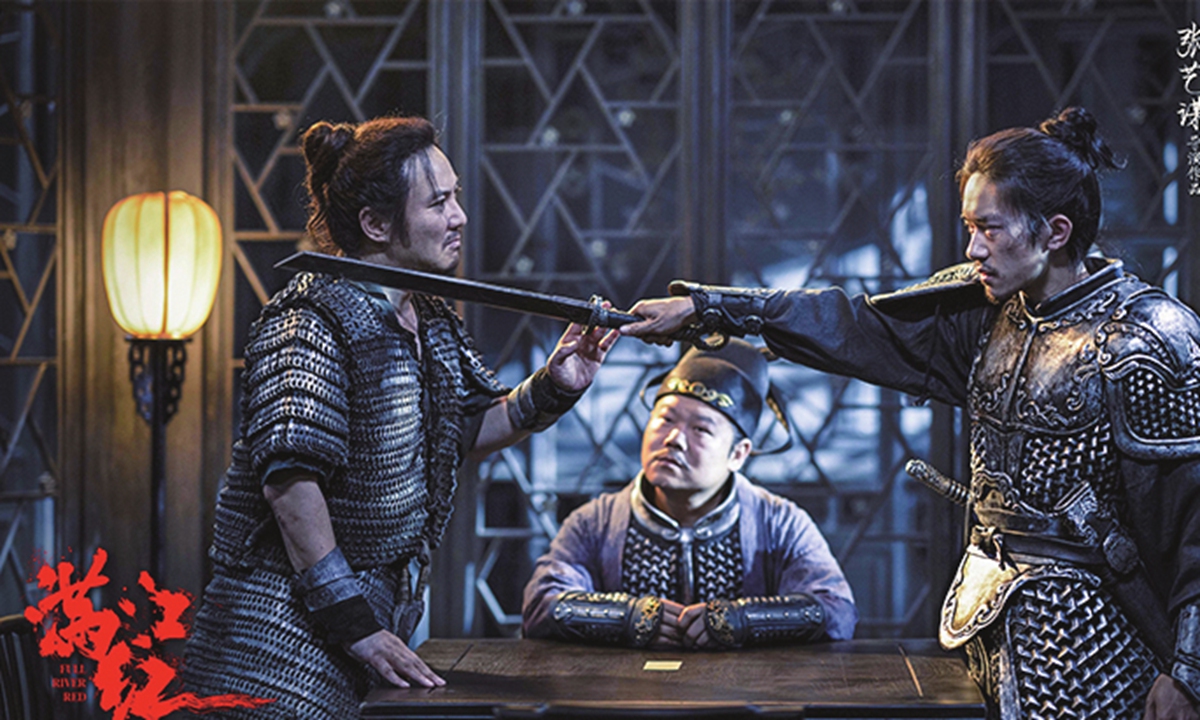ARTS / FILM
Heated discussion over film title translation reveals movies' power as cultural ambassadors: industry insiders

Promotional material for Full River Red Photo: Courtesy of Maoyan
As the most recent suspense comedy Man Jiang Hong becomes the box office champion during the Spring Festival movie season in history with a cumulative box office of over 2.8 billion yuan ($413 million), the English translation of its title Full River Red however sparked widespread discussion on social media.
The movie, directed by Chinese well-known director Zhang Yimou starring Shen Teng, Yi Yangqianxi, and Zhang Yi, tells a story which is set during the Shaoxing period of the Southern Song Dynasty (1127-1279). Four years after the patriot general and national hero Yue Fei's death, Qin Hui, a treacherous official who murdered Yue Fei, led his own troops to negotiate with the envoy from the Kingdom of Jin.
On the eve of the meeting, the envoy of the Jin died at Qin's residence, and the secret letter he was carrying disappeared.
The soldier Zhang Da (played by Shen Teng) and the deputy commander of Qin's troops Sun Jun (played by Yi Yang Qianxi) were engulfed in this huge conspiracy by chance.
Near the end of the movie, Yue Fei's well-known poem Man Jiang Hong was engraved in the hearts of the audience after a passionate performance from the actors.
This famous poem expresses the author Yue's grief and indignation at the fall of China's Central Plains and his regret at the waste of his previous efforts. It expresses his wish to continue to strive for meritorious service for this country in his prime.
However, the English translation of the film title, Full River Red, is considered by many netizens to be "too blunt,'' with many saying it will confuse people in English-speaking countries.
"Translation should take into account the meaning. Since these three words connected together do not make sense, it is better to use a phrase to show its spiritual core," a netizen named Evania posted on Sina Weibo.
In fact, in many works of sinologists, Man Jiang Hong can be constantly seen translated as Full River Red.
For example, in K'uei Hsing: A Repository of Asian Literature in Translation by Chinese-American sinologist Luo Yuzheng, Luo used exact the same translation as the movie.
Industry insiders believe the translation should be the result of careful consideration by the film crew, as this verses and its lines are all recorded in historical materials with many published translated versions to refer to.
"The film crew finally chose this option based on various factors including the market, commercial value, and artistry considerations," a senior translator at a Chinese film and television translation agency in Beijing told the Global Times.
"But I am very happy to see that there are actually many people discussing about it. They are paying more and more attention to the international exchange toward the aspects of Chinese film and television culture," she said.
"The translation of movie titles has never been an easy task as it can be seen as the bridge across the cultural backgrounds of the East and the West."

